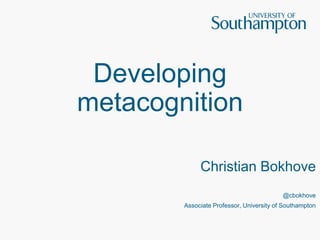
Developing metacognition
- 1. Developing metacognition Christian Bokhove @cbokhove Associate Professor, University of Southampton
- 2. Introduction Self-regulation and metacognition are among the most downloaded elements of the EEF toolkit Guidance report Increasing interest, and yet: – A lot of interventions don’t show any effects – A lot of schools implement poorly (Dignath & Buttner, 2017, De Smul et al, 2017) – Not a silver bullet 2
- 3. What is metacognition? Part of self-regulated learning - The extent to which learners are aware of: – their strengths and weaknesses, – the strategies they use to learn, – how they can motivate themselves to engage in learning, and – how they can develop strategies and tactics to enhance learning. 3
- 5. Cognition Information gathering Memorisation Understanding Applying 5
- 6. What is metacognition? Knowledge of cognition : – Knowledge about yourself as a learner – Knowledge about strategies and procedures such as reviewing, interleaving and selecting main ideas – Knowledge of why and when to use a particular strategy. Regulation of cognition: – Planning e.g. activating relevant prior knowledge, selecting appropriate strategies, and the allocation of resources. – Monitoring e.g. self-testing – Evaluation 6
- 7. What is metacognition? 7 Metacognition Cognition control monitoring Flow of Information
- 8. What is metacognition? Cognition and metacognition continuously interact For example, when memorising something, learners will: – Determine what they think is the ‘Ease of Learning’ (EOL) of a particular piece of content, leading to a strategy. – The learner will also make a ‘Judgement of Knowing’, by deciding how well s/he knows the content already, and allocate study time. – A ‘Feeling-of-Knowing’ judgement will then lead to a decision as to when to stop study 8
- 9. The role of motivation Monitoring and regulating cognition is an effortful process, and to make that effort requires motivation Some important factors: – Delay of gratification – Self-efficacy – Emotion (and the regulation thereof) 9
- 10. Why does metacognition matter? Significant impact on pupil attainment, on top of ability or prior attainment Studies suggest that early forms of metacognition are predictive of later attainment Particularly important where we want to develop independent learning So how to develop and nurture it? 10
- 12. Teacher knowledge and skills Strong understanding of the metacognitive demands of the topics you are teaching. One thing you could do is look up specific domain-oriented studies that involve metacognition. 12
- 13. Teach metacognitive strategies Closely related to the first point. Closely linked to the specific domain. Plan: what do I know, what do I need, where do I want to go? Monitor: am I doing well, is this challenging, anything I need to stop and change? Evaluate: how did I do, what did I learn, did my strategy work? 13
- 14. Explicit instruction as part of an integrated approach An example: 1. Activating prior knowledge 2. Explicit strategy instruction 3. Modelling of learned strategy 4. Memorisation of strategy 5. Guided practice 6. Independent practice 7. Structured reflection 14
- 15. Model cognitive and metacognitive skills Teacher modelling Make steps explicit Deliberate difficulties Scaffolding https://educationendowmentfoundation.org.uk/tools/guidance- reports/metacognition-and-self-regulated-learning/ 15
- 16. Appropriate challenge Role of motivation and self-confidence. ‘Goldilocks degree of challenge’: not too hard not too easy. Teacher modelling, worked examples 16
- 17. Explicitly teach independent learning skills Plan (goals), Monitor, Evaluate Learning techniques – Elaborative interrogation (generate explanation for why an explicitly stated fact or concept is true) – Practice testing – Spaced practice – Self-explanation Monitor motivation 17
- 18. Explicitly teach independent learning skills Exploratory metacognitive talk Support teacher development 18
- 19. Developing metacognition Thank you Questions or interested in this or other mathematics education project, get in touch! Dr Christian Bokhove C.Bokhove@soton.ac.uk @cbokhove Associate Professor, University of Southampton
